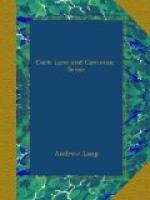exactly a case for a test, and that which was given
would have been good enough for spiritualists, though
not for more reasonable human beings. In the
village hall, in flickering firelight, the friends,
with the English observer, the ’Pakeha Maori,’
were collected. The medium, by way of a ‘cabinet,’
selected the darkest corner. The fire burned
down to a red glow. Suddenly the spirit spoke,
‘Salutation to my tribe,’ and the chief’s
sister, a beautiful girl, rushed, with open arms,
into the darkness; she was seized and held by her
friends. The gloom, the tears, the sorrow, nearly
overcame the incredulity of the Englishman, as the
Voice came, ’a strange, melancholy sound, like
the sound of a wind blowing into a hollow vessel’.
‘It is well with me,’ it said; ’my
place is a good place.’ They asked of
their dead friends; the hollow answers replied, and
the Englishman ‘felt a strange swelling of the
chest’. The Voice spoke again: ‘Give
my large pig to the priest,’ and the sceptic
was disenchanted. He now thought of the test.
’"We cannot find your book,” I said;
“where have you concealed it?” The answer
immediately came: “Between the Tahuhu of
my house and the thatch, straight over you as you
go into the door".’ Here the brother rushed
out. ’In five minutes he came back,
with
the book in his hand.’ After one or
two more remarks the Voice came, ’"Farewell!”
from deep beneath the ground. “Farewell!”
again
from high in air. “Farewell!”
once more came moaning through the distant darkness
of the night. The deception was perfect.
“A ventriloquist,” said I, “or—or,
perhaps the devil."’ The seance had
an ill end: the chief’s sister shot herself.
This was decidedly a well-got-up affair for a colonial
place. The Maori oracles are precisely like
those of Delphi. In one case a chief was absent,
was inquired for, and the Voice came, ’He will
return, yet not return’. Six months later
the chiefs friends went to implore him to come home.
They brought him back a corpse; they had found him
dying, and carried away the body. In another
case, when the Maori oracle was consulted as to the
issue of a proposed war, it said: ’A desolate
country, a desolate country, a desolate country!’
The chiefs, of course, thought the other country
was meant, but they were deceived, as Croesus was
by Delphi, when he was told that he ‘would ruin
a great empire’. In yet another case, the
Maoris were anxious for the spirits to bring back a
European ship, on which a girl had fled with the captain.
The Pakeha Maori was present at this seance, and
heard the ’hollow, mysterious whistling Voice,
“The ship’s nose I will batter out on the
great sea"’. Even the priest was puzzled,
this, he said, was clearly a deceitful spirit, or
atua, like those of which Porphyry complains, like
most of them in fact. But, ten days later, the
ship came back to port; she had met a gale, and sprung
a leak in the bow, called, in Maori, ‘the nose’
(ihu). It is hardly surprising that some Europeans
used to consult the oracle.




